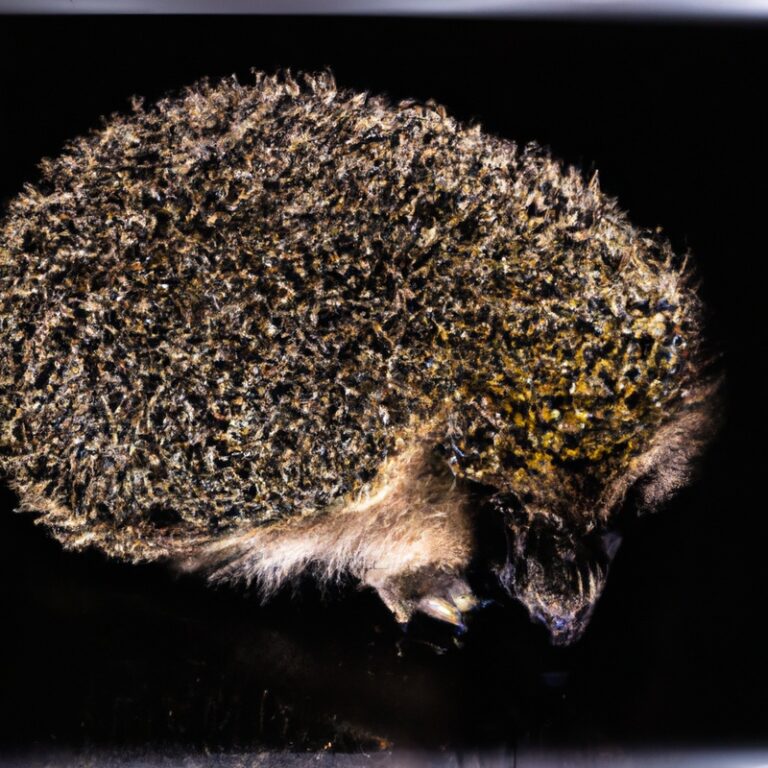How To Identify Signs Of a Healthy Hedgehog?
Key Takeaways:
- Signs of a healthy hedgehog include clear, bright eyes and a shiny, well-groomed coat.
- Healthy hedgehogs have a good appetite, eat a balanced diet, and maintain a stable weight.
- Active and alert behavior, with no signs of lethargy or abnormal movement, is indicative of a healthy hedgehog.
- Regular veterinary check-ups and maintaining a clean and stress-free environment are essential for the overall health of a hedgehog.
Are you a proud hedgehog owner or thinking about getting one as a pet?
Well, you’ve come to the right place! In this article, we will explore the fascinating world of hedgehog health and learn how to identify the signs of a healthy hedgehog.
From physical indicators like glossy fur and bright eyes to behavioral cues like active curiosity and regular eating habits, we’ll cover it all.
Plus, we’ll also discuss what to do if you notice any signs of an unhealthy hedgehog and how to maintain your little spiky friend’s well-being.
So, are you ready to become a hedgehog health expert?
Let’s dive in!
| Signs of a Healthy Hedgehog | Signs of an Unhealthy Hedgehog |
| Shiny and clean fur | Dull or matted fur |
| No visible parasites | Ticks, fleas, or mites present |
| Clear and bright eyes | Redness, discharge, or swelling in the eyes |
| Active and alert behavior | Lethargic or unresponsive behavior |
| Solid and regular appetite | Lack of appetite or refusing food |
| Smooth and dry skin | Scaly, flaky, or wet skin |
| Regular grooming and self-anointing | Lack of self-grooming or excessive scratching |
| Regular bowel movements | Diarrhea or constipation |
| Normal breathing patterns | Labored or wheezing breathing |
| Normal body weight | Significant weight loss or gain |
What is a healthy hedgehog?
A healthy hedgehog is one that exhibits physical and behavioral signs of good health.
Physical signs of a healthy hedgehog
A healthy hedgehog will display the following physical signs:
- Bright, clear eyes: A healthy hedgehog will have alert, shiny eyes without any discharge or cloudiness.
- Smooth and clean fur: The fur should be soft, glossy, and free from mats or bald spots. It should also be evenly distributed across the body.
- Normal weight: A healthy hedgehog will have a good body condition, neither too thin nor too overweight. You should be able to feel their ribs without excessive pressure.
- Active and energetic: A healthy hedgehog will be active during their active hours, moving around their enclosure and showing interest in their surroundings.
- Normal breathing: A healthy hedgehog will have regular and quiet breathing, without any wheezing, coughing, or difficulty breathing.
- Clean and healthy ears: The ears should be clean, without any discharge or strong odor.
Remember, if you notice any concerning changes in your hedgehog’s physical appearance or behavior, it is always best to consult with a veterinarian who specializes in exotic pets.

Behavioral signs of a healthy hedgehog
Behavioral signs of a healthy hedgehog include being active and alert, having a good appetite, and exhibiting curious and exploratory behavior. A healthy hedgehog will also have regular grooming habits, maintaining clean and sleek quills.
It is important to observe your hedgehog’s behavior regularly to ensure their overall well-being.

Physical signs of a healthy hedgehog
A healthy hedgehog will exhibit signs such as glossy and clean fur, bright and alert eyes, clean and dry ears, healthy and smooth skin, and a normal body weight.
Glossy and clean fur
A glossy and clean fur is a key sign of a healthy hedgehog. It indicates that the hedgehog is taking good care of itself and is free from any skin or coat issues.
When you observe a hedgehog with shiny and smooth fur, it shows that they are in good overall health.
Additionally, a clean fur suggests that the hedgehog is practicing proper grooming habits, which is essential for their well-being.
Bright and alert eyes
Bright and alert eyes are a key indicator of a healthy hedgehog. If the eyes are clear and free from discharge, it’s a good sign that your hedgehog is in good health.
The eyes should also be bright and responsive, showing interest and curiosity.
Dull or cloudy eyes, or eyes that are watering or crusty, can be a sign of an underlying health issue. Always monitor your hedgehog’s eyes and consult a veterinarian if you notice any concerning changes.
Clean and dry ears
Clean and dry ears are important indicators of a healthy hedgehog. Check your hedgehog’s ears regularly to ensure they are free from dirt, debris, or excessive wax buildup.
Clean them gently using a damp cloth or an ear cleaning solution recommended by your veterinarian.
Avoid using cotton swabs as they can damage the delicate ear canal. It’s also essential to keep the ears dry to prevent the growth of bacteria or fungi.
If you notice any abnormalities like redness, swelling, or discharge, consult a veterinarian for further evaluation.
Healthy and smooth skin
Having healthy and smooth skin is essential for a hedgehog’s overall well-being. Here are some signs to look out for:
- Supple and soft texture: A healthy hedgehog should have skin that feels smooth and pliable to the touch. Avoid any rough or dry patches.
- Clean appearance: The skin should appear clean and free from any redness, swelling, or sores. Any signs of irritation or infection should be checked by a veterinarian.
- Normal pigmentation: The skin color should be consistent all over the body, without any areas of abnormal discoloration.
- No excessive shedding: While some shedding is normal, excessive hair loss or constant scratching may indicate an underlying skin issue.
Remember, maintaining a hedgehog’s skin health is crucial for their overall happiness and comfort. Regular grooming, proper nutrition, and a clean living environment can help ensure their skin stays healthy and smooth.
Normal body weight
Normal body weight is an important indicator of a hedgehog’s health.
On average, adult hedgehogs weigh between 400 and 600 grams (14-21 ounces).
It’s essential to monitor your hedgehog’s weight regularly to ensure it stays within this range.
A sudden and significant weight loss or gain can be a sign of underlying health issues.
If you notice any drastic changes in your hedgehog’s weight, it’s best to consult with a veterinarian for guidance.
Behavioral signs of a healthy hedgehog
When looking for behavioral signs of a healthy hedgehog, pay attention to their active and curious behavior. Additionally, observe their regular eating and drinking habits, normal feces and urine, as well as their social interaction and playfulness.
Active and curious behavior
Active and curious behavior is a positive sign of a healthy hedgehog. A healthy hedgehog will be alert, constantly exploring its surroundings, and showing an interest in its environment.
It will engage in activities such as running on its wheel, climbing on objects in its enclosure, and investigating toys or items in its habitat.
A healthy hedgehog will also display curiosity by sniffing, poking, and investigating new things it encounters. Monitoring your hedgehog’s activity level and curiosity is important for ensuring its overall well-being.
Regular eating and drinking habits
Regular eating and drinking habits are clear signs of a healthy hedgehog. A healthy hedgehog will eat its food consistently and not exhibit any noticeable changes in appetite.
It will also drink water regularly, ensuring hydration.
Monitoring your hedgehog’s eating and drinking habits is essential for maintaining its overall well-being. Keep an eye on how much food and water your hedgehog consumes each day to ensure it stays on a healthy and balanced diet.
Normal feces and urine
Normal feces and urine are important indicators of a hedgehog’s health.
When it comes to feces, they should be firm, dark brown, and cylindrical in shape.
Loose or watery stools may indicate digestive issues.
As for urine, it should be clear or slightly yellow in color and should not have a strong odor.
Any drastic changes in the appearance or smell of feces or urine should be monitored closely and potentially addressed by a veterinarian.
Social interaction and playfulness
Social interaction and playfulness are important indicators of a healthy hedgehog. A socially interactive hedgehog will enjoy spending time with you, seeking your attention, and showing curiosity towards their surroundings.
They may wag their tail, puff their quills, or even lick you! Playfulness can be seen through their willingness to explore, engage in activities like climbing or running, and their responsiveness to toys or interactive games.
A hedgehog that displays social interaction and playfulness is likely happy and content.
Signs of an unhealthy hedgehog
There are several signs that can indicate an unhealthy hedgehog.
Dull or matted fur
Dull or matted fur is a sign that your hedgehog may not be in the best health.
If their fur looks lifeless and lacks its usual sheen, it could indicate an underlying issue.
Matted fur, on the other hand, can be a result of poor grooming or even a sign of an infestation such as fleas or mites.
Regularly brushing your hedgehog’s fur and keeping an eye out for any changes in its appearance can help you identify and address potential health problems early on.
Cloudy or sunken eyes
Cloudy or sunken eyes in a hedgehog can be a sign of health issues. If your hedgehog’s eyes appear foggy or have a milky appearance, it could be a sign of an eye infection or injury.
Additionally, if their eyes appear sunken, it may indicate dehydration or an underlying health issue.
It’s important to consult with a veterinarian to determine the cause and provide appropriate treatment. Regularly monitoring your hedgehog’s eyes can help catch any potential issues early.
Discharge or foul odor from the ears
If you notice a discharge or foul odor coming from your hedgehog’s ears, it could be a sign of an infection or mites. It’s important to address this issue promptly to prevent further complications.
Take your hedgehog to a veterinarian who specializes in exotic pets for a proper diagnosis and treatment plan.
They may prescribe medication or recommend cleaning the ears regularly with a special solution. Regular veterinary check-ups can help catch any potential ear problems early on.
Dry or flaky skin
Dry or flaky skin in hedgehogs can be a sign of an underlying health issue. It is important to closely monitor your hedgehog’s skin condition and seek veterinary care if you notice any changes.
Some potential causes of dry or flaky skin include mites, fungal infections, allergies, or a lack of essential fatty acids in their diet.
Providing a balanced diet, proper hydration, and regular baths can help maintain healthy skin. A veterinarian can provide a proper diagnosis and recommend appropriate treatment if necessary.
Dramatic weight loss or gain
Dramatic weight loss or gain can indicate an underlying health issue with your hedgehog.
If your hedgehog is rapidly losing weight, it could be a sign of illness, malnutrition, or dental problems.
On the other hand, excessive weight gain could be due to overeating or a lack of exercise.
Monitoring your hedgehog’s weight regularly and consulting a veterinarian if you notice any significant changes is important for their well-being.
Additionally, providing a balanced diet and engaging your hedgehog in regular physical activity can help maintain a healthy weight.
When to seek veterinary care for your hedgehog
If you notice persistent physical signs, abnormal behavior, changes in bathroom habits, or signs of distress or pain in your hedgehog, it’s time to seek veterinary care.
Persistent or concerning physical signs
Persistent or concerning physical signs in hedgehogs can indicate underlying health issues that require attention.
These signs may include changes in appetite or weight, difficulty breathing, diarrhea or abnormal feces, skin abnormalities such as bald patches or sores, and limping or difficulty moving.
Additionally, if you notice any discharge from the eyes, nose, or genitals, it’s important to seek veterinary care.
Regularly monitoring your hedgehog’s physical appearance and behavior can help identify any abnormalities and ensure their well-being.
Abnormal behavior or lack of appetite
If your hedgehog is displaying abnormal behavior or has a lack of appetite, it could be a sign of an underlying health issue.
Some common abnormal behaviors include excessive scratching, lethargy, or aggression.
A lack of appetite could indicate dental problems, gastrointestinal issues, or stress.
It’s important to monitor your hedgehog closely and consult a veterinarian if you notice any concerning changes in their behavior or appetite.
They can provide the necessary guidance and treatment to help your hedgehog get back to a healthy state.
Changes in bathroom habits
Changes in bathroom habits can indicate health issues in hedgehogs. Look out for any sudden changes in frequency, consistency, or color of their droppings.
Diarrhea or constipation may signal digestive problems.
Difficulty urinating or blood in urine can be signs of a urinary tract infection. If you notice any changes in your hedgehog’s bathroom habits, it’s important to consult a veterinarian who specializes in exotic pets.
They will be able to diagnose and treat any underlying health issues to ensure your hedgehog stays happy and healthy.
Any signs of distress or pain
Any signs of distress or pain in your hedgehog should be taken seriously. Look out for unusual behavior, such as excessive scratching, self-biting, or aggressive tendencies.
Physical signs like weight loss, difficulty breathing, or limping are also red flags.
Check for signs of discomfort, like hunching or sensitivity when touched. Changes in appetite, water consumption, or bathroom habits can also indicate pain.
Trust your instincts and consult a veterinarian if you notice any concerning signs in your hedgehog’s behavior or physical appearance.
How to maintain a healthy hedgehog
Maintaining a healthy hedgehog involves providing a proper diet, a clean living environment, regular exercise, veterinary check-ups, and socialization.
Clean and comfortable living environment
To ensure a clean and comfortable living environment for your hedgehog, there are a few key things to remember.
- Provide a spacious and suitable cage with bedding that is safe and easy to clean, such as fleece liners or paper-based bedding.
- Regularly clean the cage, removing any feces, urine, or uneaten food, and disinfect it with hedgehog-safe cleaning products.
- Keep the cage at a suitable temperature, between 72-80°F (22-27°C, and provide a dark, quiet area for your hedgehog to sleep during the day.
- Stimulate their natural behaviors by adding toys, tunnels, and hiding spots to their cage, creating an enriching environment.
- Ensure fresh water is available at all times, and provide a balanced diet of high-quality commercial hedgehog food, supplemented with occasional insect treats and vegetables.
Remember, maintaining a clean and comfortable living environment is vital for your hedgehog’s overall health and well-being.
Regular exercise and mental stimulation
Regular exercise and mental stimulation are key aspects of keeping your hedgehog healthy and happy. Providing your hedgehog with opportunities to exercise, such as through the use of a safe and spacious exercise wheel or toys, can help prevent obesity and promote overall vitality.
Additionally, engaging your hedgehog mentally with interactive toys or puzzles can stimulate their natural curiosity and prevent boredom.
Remember to always supervise your hedgehog during exercise and choose activities that are safe and suitable for their size and abilities.
Regular veterinary check-ups and vaccinations
Regular veterinary check-ups and vaccinations are essential for maintaining the health of your hedgehog.
During check-ups, the veterinarian can assess your hedgehog’s overall well-being, detect any potential health issues, and provide necessary treatments.
Vaccinations, on the other hand, protect your hedgehog against common diseases that can be harmful or even fatal.
By scheduling regular check-ups and keeping up with vaccinations, you can ensure that your hedgehog stays healthy and lives a long, happy life.
Bonding and socialization with your hedgehog
Bonding and socialization with your hedgehog is essential for building a strong relationship and ensuring your pet’s well-being.
Spend time with your hedgehog every day, talking to it gently and handling it regularly to build trust.
Offer treats and rewards to create positive associations.
Create a safe and stimulating environment with toys and hiding spots.
Avoid sudden movements or loud noises that can startle your hedgehog.
Patience and consistency are key when it comes to bonding with these prickly little creatures.
Frequently Asked Questions about hedgehog health
What should I feed my hedgehog to keep it healthy?
To keep your hedgehog healthy, you should feed it a balanced diet that consists mainly of high-quality hedgehog food.
Look for commercially available hedgehog food that contains a mix of proteins, fats, and fiber.
Additionally, you can supplement their diet with small amounts of fresh fruits, vegetables, and insects.
It’s important to avoid feeding them foods that are high in sugar, salt, or additives.
Provide fresh water at all times and monitor their eating habits to ensure they are getting the right amount of food.
How often should I clean my hedgehog’s cage?
Cleaning your hedgehog’s cage is important for their health and well-being. It is recommended to clean the cage at least once a week, ensuring that you remove any soiled bedding, feces, and uneaten food.
Additionally, spot clean the cage daily to maintain cleanliness.
Keep in mind that individual hedgehogs may have different needs, so it’s essential to observe their behavior and adjust the cleaning frequency accordingly. Regular cleaning helps prevent odors and keeps your hedgehog’s environment hygienic.
Are there any common health issues that hedgehogs are prone to?
Hedgehogs can be prone to several common health issues.
Some of these include obesity, dental problems, and respiratory infections.
Obesity can occur if hedgehogs are overfed or not given enough exercise.
Dental problems can arise from a poor diet or lack of dental care.
Respiratory infections can be caused by damp or dirty living conditions.
Regular veterinary check-ups and a clean, balanced diet can help prevent these health issues in hedgehogs.
Can I give my hedgehog treats, and if so, what are the best options?
Yes, you can give your hedgehog treats, but it’s important to choose the right options to keep them healthy.
The best treats for hedgehogs are usually insects, such as mealworms or crickets.
These can be given as occasional treats and are a good source of protein.
Other options include small amounts of fruits like apple or berries, but be cautious as too much sugar can be harmful to hedgehogs.
Always remember to provide fresh water and consult with a veterinarian for specific dietary advice for your hedgehog.
How can I prevent obesity in my hedgehog?
To prevent obesity in your hedgehog, it’s important to regulate their diet and provide them with plenty of exercise opportunities.
Here are some tips:
- Limit the portion size of their food to avoid overfeeding.
- Offer a balanced diet consisting of high-quality hedgehog food and occasional treats.
- Avoid feeding them too many fatty or sugary foods.
- Provide them with a variety of toys and a safe area to explore and exercise in.
- Monitor their weight regularly and consult a veterinarian if you notice any sudden changes.
Remember, maintaining a healthy weight is crucial for your hedgehog’s overall well-being!
Final Verdict
Recognizing the signs of a healthy hedgehog is essential for the well-being of these delightful pets.
Physical indicators, such as glossy fur, bright eyes, clean ears, healthy skin, and normal body weight, can help assess their overall health.
Additionally, observing active and curious behavior, regular eating and drinking habits, normal feces and urine, and social interaction can provide further assurance of their well-being.
It is crucial to seek veterinary care if any concerning signs or changes in behavior occur.
Maintaining a healthy hedgehog involves providing a proper diet, a clean living environment, regular exercise, veterinary check-ups, and bonding with your pet.
By taking these steps, you can ensure the well-being and happiness of your hedgehog companion.







